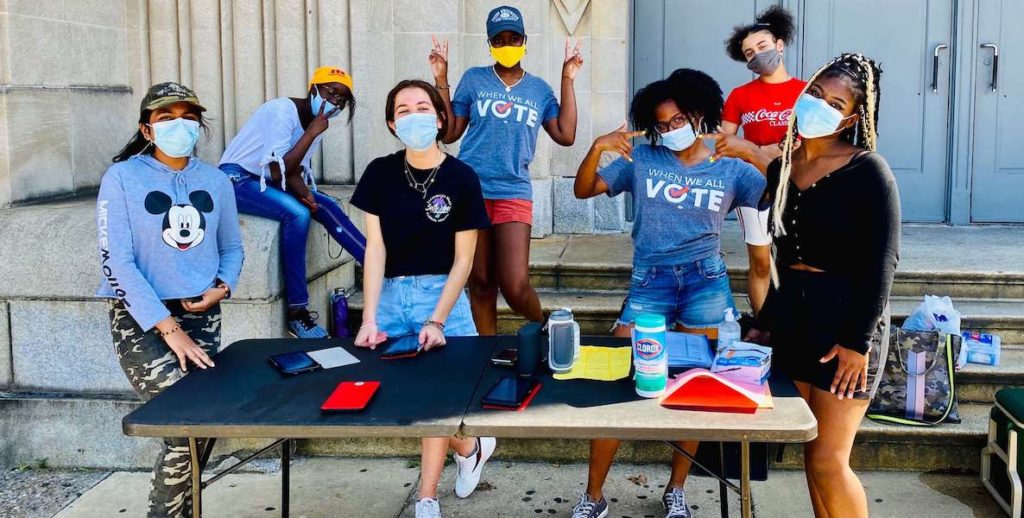Thomas Quinn, super-hero of Philly’s youth vote, thought he’d slain the dragon, but the dragon lashed back.
The weapon: Go digital. Everything was primed to roll out a cool tablet-computer system that kids would deploy to get their peers on the rolls.
Then Philly closed the schools.
Quinn is obsessed with registering young voters, always has been. Teaching civics and social science at Central High School, he prods his students to sign up the minute they turn 18. You’d think all high school teachers would do that, but you’d be wrong. Only about six percent of teens in American schools are ever offered the opportunity to register.
No wonder. Legendarily overworked teachers have to send for the forms, identify eligible students and get the forms to them, bug kids to fill them out, then get them back and hand-deliver or mail them to the proper authorities. Who needs it?
What’s more, when Quinn, who works with Philly Youth Vote, is out on the street with his Philly kids snagging passersby to sign up, it’s even worse. Lugging around forms, filling them out is no one’s idea of fun. And inevitably, a kid’s going to lose them on the bus.
Up until yesterday, Quinn was all set to ditch the paper. But things fell apart when Philly’s school board decided to shutter the schools until after November’s election. Now what?
But first, what was the deal in the first place?
Before the last election, in 2017, Quinn was collaborating with a local refugee/immigrant organization (he’s a kind of collaborating octopus, with tentacles that reach just about every group in the city). Quinn learned about their brilliant idea: Go digital.
SEAMAAC, the group that works with immigrants, had offered Quinn a GOTV (get out the vote) assembly at Central about their organization that year. He took them up on the offer, and their organizing team showed up at Central bearing five brand new tablet computers. Then they showed how young people, armed with their own cell phones and these tablets—embedded with a script to read, and access to “predictive” voters of their own age—can phone prospects or get passersby on the street to register.
All they need to do is download voter lists and registration forms, help prospects fill in the blanks and get them to sign on the touchpad, a breeze for anyone in their teens.
About 30 students registered on the spot that day. Quinn was wowed. “If they’d arrived with paper forms and set up a table, it wouldn’t have been the same. It would have just been rah-rah and no follow-through. But teenagers love technology.”
And there was no downside. The method is non-partisan, and the caller doesn’t see any private information about their prospect. Bonus: When a new voter registers, their information—voluntary and private, things like email and cellphone numbers—is captured by Pennsylvania Department of State’s Online Voter Registration (OVR) app, to be pulled up later in phone banking or texting to get out the vote.
Eight thousand kids in Philly public schools reach their 18th birthday every year. With 100 tablets, each reaching 800 eligible students, there’d be 8,000 new voters!
After the demo, Quinn went to work with SEAMAAC.
Quinn wrote up a fundraising pitch, then eventually helped set up a crowdsourcing fundraiser to solicit enough to buy the first 50 tablets. A team of teachers, kids, parents and other involved citizens raised $4,000 in three days. Unheard of.
So Philly Youth Votes—Quinn’s student organizing group—was set to distribute 50 brand new, stripped-down $80 Android tablets, complete with software.
Student volunteers would come into school in the morning, pick up a tablet, take it home to make calls, or go to a registration event, and bring it back at day’s end. “It’s like a lending library,” Quinn explained excitedly last week when we spoke.
What’s more, Quinn-the-collaborator is hooked up with Philly organizations galore: Vote that Jawn, Philly Youth Votes, The Committee of Seventy, and When We All Vote, Michelle Obama’s national organization. With all the social media links, and all the juiced young citizens, there was going to be a wild and wonderful fall push to register first-timers throughout the city.
Right. But on Thursday, July 30, the whole tech dream collapsed with the schools’ shut-down. With no physical classrooms, there’d be no way to deploy tablets. All that youthful zeal would go to waste.
But Quinn’s no quitter.
“There’s so much fervor for politics among these kids,” he said. Just as the Parkland School shootings in Florida woke people up to the need for civic participation in the 2018 election, the current turmoil has unleashed enormous energy. “Passions are running high,” he says, “what with street protests, Black Lives Matter, the pandemic.”
Quinn would be out there with papyrus and quills if that was all that was available, so if paper is the medium, paper it will be. He’s meeting with the donors who put up the funds for tablets, working on a crash Plan B. The tablets and software will be good for six to eight years, and Quinn is committed to year-round, systematic organizing. Forever. So stay tuned for the next midterms. Certainly nothing has been wasted, maybe just, as the saying goes, repurposed.
Round One may have gone to the paperwork dragon, but we’re betting on Philly youth voters to beat that sucker back and, finally, slay it.
Rebecca Pepper Sinkler is an editor of Vote That Jawn

